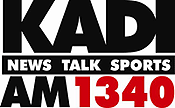
Jeff Moorad has resigned as Arizona Diamondbacks chief executive officer and says he has reached an agreement in principle to buy the San Diego Padres.
Moorad said Friday he heads a "small but significant" group of investors that has an exclusive right to complete the specifics of negotiations with Padres owner John Moores. Moorad said he hopes the transaction can be completed in the next three months.
Moorad said he has a long friendship with Moores and his wife, Becky, whose divorce precipitated the Padres' potential sale.
Discussions on the potential purchase became extensive after Moores hired Goldman Sachs to oversee the sale of the club in late November, Moorad said.
"We have a lot of work to do," Moorad said on a conference call, "but John and Becky and the folks at Goldman Sachs have been very attentive and focused as I intend to be over the next month or so. I'm hopeful that we can get to the finish line."
The Moores reportedly own 90 percent of the Padres. Community property laws in California give Becky Moores a 50 percent share of that asset and she must agree to any sale.
San Diego owner John Moores confirmed in an e-mail to The Associated Press that Moorad had exclusive negotiating rights to buy the team. Jesse Jacobs from Goldman Sachs didn't immediately return a call or e-mail seeking comment.
Moorad said he would be the majority owner if the deal goes through. He would have to sell his share of ownership in the Diamondbacks if the Padres deal is finalized.
He said he first approached Moores about buying the team when rumors surfaced that the Padres might be for sale.
"I told him that I was very happy in Arizona, that I was very excited about the organization that the Diamondbacks had become," Moorad said, "and that the only thing that would turn my head would be the possibility of returning to California, particularly Southern California."
Moores got back to him "a couple of months ago" to say that indeed he was selling the team, and the talks progressed from there. Moorad said he was required to resign from his Arizona job in order to have exclusive rights to complete negotiations with the Padres. Diamondbacks president Derrick Hall replaces Moorad as CEO.
The Moores would continue to have a share of the team's ownership for a yet undetermined number of years, Moorad said.
The transaction would come in an economy that is reeling on all fronts.
"I think sports teams will be challenged going forward as all businesses will be in the short term," Moorad said, "but I'm bullish on baseball and I'm particularly bullish on baseball in Southern California. I think we've shown in Arizona there are ways to not only survive but win even on a medium-sized market payroll."
Moorad grew up in Modesto, Calif., and graduated from UCLA in 1978 before getting his law degree at Villanova. He and his family lived in Newport Beach, Calif., for more than 20 years and still have a home there.
Moorad was a formidable agent who represented several major sports figures, including baseball's Manny Ramirez and Eric Karros, before he purchased a share of the Diamondbacks in 2004. His connection as an agent concerned other owners, so Ken Kendrick continued to serve as managing partner, representing the team in league ownership issues.
However, Kendrick said those concerns have been erased by Moorad's performance since assuming his CEO position with the Diamondbacks.
"Jeff has established himself through the years with us and I think Major League Baseball, from discussions I've had with them directly, would be comfortable with him controlling an ownership group with another club," Kendrick said.
Moorad also said he's been assured his past as an agent would not be an obstacle to him being a principle owner.
"I think he has roots that are very deep in Southern California," Kendrick said. "To get an opportunity in San Diego is exactly on point for the family in terms of that element of their lives."
Moorad lured many of the current top Diamondbacks officials, including Hall and general manager Josh Byrnes, to their jobs in Arizona. Hall joined the team in May 2005 as senior vice president, communications. Marketing-related issues were added to Hall's responsibilities in December 2005. He was promoted to president on Sept. 6, 2006, and will retain that title in addition to his new CEO position.
Hall called his promotion "bittersweet" because of his long relationship with Moorad, but added that he looked forward to the challenges of his new position.
Source: San Diego Union-Tribune







